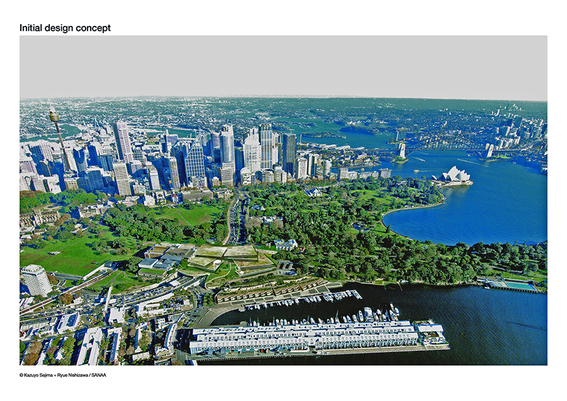
R
E
V N
E
X
T
On May 27, Ryue Nishizawa (left) and Kazuyo Sejima (center) of Tokyo-based architectural firm SANAA won the bid for Art Gallery of New South Wales’s expansion project, titled the Sydney Modern Project. Photo by Michael Young for ArtAsiaPacific.
Tokyo-based architectural firm SANAA has been selected by the Art Gallery of New South Wales (AGNSW), Sydney’s leading public art institution, to build its AUD 450 million (USD 346 million) extension called the Sydney Modern Project.
Making the announcement on May 27, AGNSW director Michael Brand called SANAA’s design “totally compelling,” stating that the museum’s seven-person selection panel was unanimous in its choice. The Pritzker Prize-winning architect studio beat out a shortlist of four competitors, narrowed down from the 12 firms invited to submit designs last year. Brand anticipates the new building will be completed by 2021 to celebrate the 150th anniversary of the gallery’s founding.
SANAA and its principal architects, Sejima and Nishizawa, have established an international reputation for museum design, having completed such projects as New York’s New Museum, the Louvre-Lens Museum in France, and Japan’s 21st Century Museum of Contemporary Art.
At the media conference, Brand said Sejima and Nishizawa’s design would transform the gallery into a “global museum to match this global city of Sydney.” Stressing that the selection panel “chose the architectural firm, not the architect,” he added that the design presented at the media conference was only a preliminary proposal. The AGNSW will work closely with SANAA in the next 12 months to develop a final concept in consultation with the institution’s key stakeholders, including members of government, museum staff, the gallery foundation and the public.
The current proposal shows the 20-year-old studio’s signature style of simplicity. A series of flat-roofed pavilions and glass-walled terraces will fan out toward the harbor and will be built on land currently owned by the adjacent Royal Botanic Gardens, north of the museum. Between the new extension and the existing heritage building will be an open-sided, flat-roofed cultural plaza. Interior spaces will merge seamlessly with exterior zones, while the overall layout will echo the contours of the land. Preliminary illustrations suggest that the expansion could as much as double the institution’s total exhibition space.
This is not the first time that SANAA has pitched for and won an architectural competition in Sydney. In 1997 the firm won the competition to build the Museum of Contemporary Art (MCA)’s new Cinémathèque facing Circular Quay and the Opera House. The commission was cancelled before work began and a new competition was subsequently held in 2000, which SANAA did not apply for on the assumption that they had already won earlier.
Any ill feeling from 15 years ago seems now to have dissipated for Sejima and Nishizawa, who told ArtAsiaPacific that the aborted MCA project was actually the beginning of “the SANAA story.” “[The MCA] was our first invited competition, and that was the beginning of SANAA and was therefore very important for us,” said Sejima to AAP after the media conference.
Now the only hurdle remaining for the AGNSW is to raise the AUD 450 million needed for the construction—a daunting prospect given that a limited amount of government money has been promised. In fact, none of the state government ministers attended the media view; a gallery spokesperson seemed at a loss to explain the absence. In a gallery press release issued at the event, State Minister for the Arts Troy Grant said, “The NSW Government has provided AUD 10.8 million . . . to allow the Art Gallery of NSW to advance their plans for a major transformation of one of the state’s leading cultural institutions.” There was no mention of any further government support.




